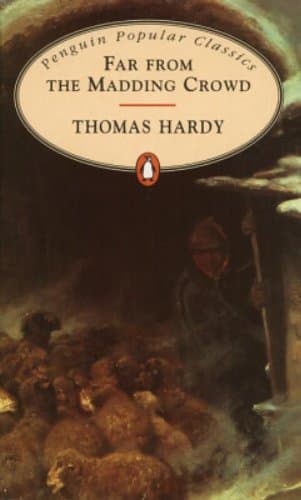
Thomas Hardy, Far from the Madding Crowd
Value For Money
Thomas Hardy, Far from the Madding Crowd
When you purchase through links on our site, we may earn an affiliate commission. Here's how it works.

User Reviews
Value For Money
Reading Thomas Hardy, Far From The Madding Crowd A
Reading Thomas Hardy, Far from the Madding Crowd again in 36 degrees of heat in Tunisia was a delightful and slightly unusual experience! As I sat moderately baking in occasional shade, Bathsheba and Oak wrestled out their very pragmatic romance amidst the debris and lives of other characters whose impracticality and passion proves their undoing. The novel recommends survival through work and co-operation and this core value in the narrative far from being dull and tame compared to the heated, reckless drives of others,provides humour and finally healing. The scenes where Oak saves the gas ridden sheep and the stacks communicate Oak's consummate competence and care and Hardy 's sensory skills are marvellously suggestive and psychologically apt:
'He felt a zephyr curling about his cheek and turned.It was Bathsheba's breath - she had followed him, and was looking into the same chink.'
Far From The Madding Crowd is full of 'peeping tom' moments where characters watch each other through hedges,chinks and doors! This moment is beautifully laid out, the metaphor 'zephyr' registers the magic of Bathsheba's physicality...even more, her very breath, her life force enchants Oak. She is as special and magical to Oak as any legend from the Greeks. The simplicity of this shared watching explores their natural equality and the unconscious attraction of Bathsheba for Oak. How beautifully erotic is this scene and yet how it reveals their hesitancy and delay.
Hardy allows Bathsheba her eventual happiness which is rare indeed in the so-called 'great' novels, and he is also astute in granting Bathsheba autonomy in characterisation. She remains true to her perverse, challenging self and we do not see a shadowy, chastened figure at the end, though this Bathsheba has learnt about consequences!
' I have thought so much more of you since I fancied you did not want even to see me again.'
Human nature is perverse! This admission is fully in keeping Bathsheba's vanity and wilfulness. Yet is also reinforces the honesty and intimacy that has existed between them. Such intimacy elevates their relationship and makes their future marriage and happiness certain.
A final glimpse, simply because it is highly Impressionistic and tender and would not be out of keeping in a Katherine Mansfield story or a Monet painting:
'Ten minutes later, a large and smaller umbrella might have been seen moving from the same door, and through the mist along the road to the church.'
The tenderness of the ordinary here is palpable. Oak and Bathsheba are granted some privacy away from the speculative eye of reader and community and under their umbrelllas remains sanctuary and promise!
Wonderful!
Q&A
There are no questions yet.